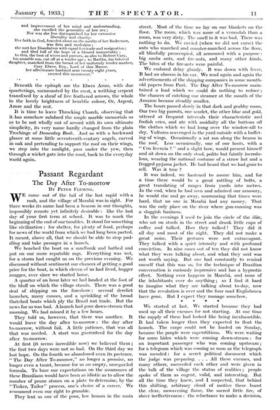Passant Regardant
The Day After To-morrow Br PETER FLEMING.
WE came out of the tail of the last rapid with a rush, and the village of Marabil was in sight. For three weeks its name had been a beacon in our thoughts, impossibly remote yet infinitely desirable : like the last day of your first term at school. It was to mark the beginning of the end of our troubles. It stood for something like civilization : for shelter, for plenty of food, perhaps for news of the world from which we had long been parted. It meant, above all, that we should be able to stop pad- dling and take passages in a launch.
We beached the boat on a sandbank and bathed and put on our more reputable rags. Everything was wet, for a storm had caught us on the previous evening. We discussed without sentiment our chances of getting a good -price for the boat, in which eleven of us had lived, hugger mugger, ever since we started home.
A quarter of an hour later we had landed at the foot of the bluff on which the village stands. There was a good deal of shipping on the foreshore : several derelict launches, many canoes, and a sprinkling of the broad thatched boats which ply the Brazil nut trade. But the news for us was bad. A launch had gone down-stream that morning. We had missed it by a few hours.
They told us, however, that there was another. It would leave the day after to-morrow : the day after to-morrow, without fail. A little patience, that was all that was needed. A start was guaranteed for the day after to-morrow.
At first (it seems incredible now) we -believed them ; the first two days were not so bad. On the third day we lost hope. On the fourth we abandoned even its pretence. ." The Day After To-morrow," no longer a promise, no longer even a taunt, became for us an empty, unregarded formula. To base our expectations on the assurances of these Brazilians would have been as idiotic as to allow the number of prune stones on a plate to determine, by the "Tinker, Tailor" process, one's choice of a career. We renounced even our right to grumble.
They lent us one of the poor, low houses in the main
street. Most of the time we lay on our blankets on the floor. The room, which was more of a verandah than a room, was very dirty. The stria in it was bad. There was nothing to do. We envied (when we did not curse) the ants who marched and counter-marched across the floor, all blissfully preoccupied, all armoured with a purpose : big melba ants, and fire-ants, and many other kinds. The bites of the fire-ants were painful.
We endured delay glumly. B was down with fever, R had an abscess in his ear. We read again and again the advertisements of the shipping companies in some month- old papers from Para. The Day After To-morrow main- tained a lead which we could do nothing to reduce ; the chances of catching our steamer at the mouth of the Amazon became steadily smaller.
The hours passed slowly in that dark and grubby room. Our two big parrots, one scarlet, the other blue and gold, uttered at frequent intervals their characteristic and foolish cries, and ate with assiduity all the buttons off the clothes which we had hung over the window-sill to dry. Vultures scavenged in the yard outside with a buffet- ing of wings. Occasionally a rat ran along the beams in the roof. Less occasionally, one of our hosts, with a "Con licencia ? " and a slight bow, would present himself and sit down on the only stool, polite but faintly incredu- lous, wearing the national costume of a straw hat and a frogged pyjama jacket. He had heard that we had guns to sell. Was it true ?
It was indeed, we hastened to assure him, and for a time there would be a great rattling of bolts, a great translating of ranges from yards into metres. In the end, when he had seen and admired our armoury, he would rise and go away, murmuring that times were hard, that no one in Mamba had any money. That was the only place on the river where gun-running was a sluggish business.
In the evenings I used to join the circle of the elite, who sat on stools in the street and drank little cups of coffee and talked. How they talked ! They did it all day and most of the night. They did not make a great noise. Their gestures were not extravagant. They talked with a quiet intensity and with profound conviction. In nine cases out of ten they did not know what they were talking about, and what they said was not worth saying. But one had constantly to remind oneself that this was so, for the technique of Brazilian conversation is curiously impressive and has a hypnotic effect. Nothing ever happens in Mamba, and none of the inhabitants ever do anything ; so I find it hard to imagine what they are talking about to-day, now that the revolution is over and the four mad Englishmen have gone. But I expect they manage somehow.
* * * *




































 Previous page
Previous page